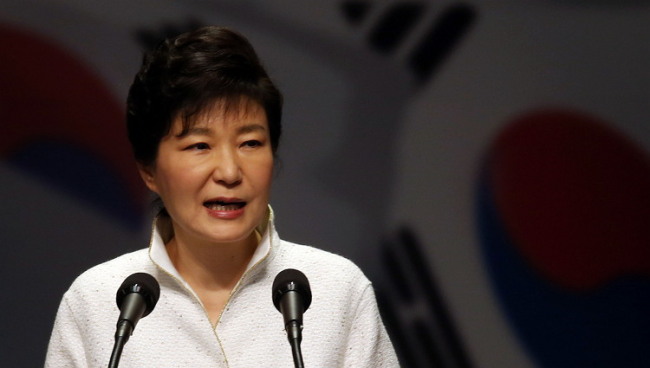North Korea criticizes Park’s proposals as trite, insincere
Pyongyang rebukes allies for upcoming drills, warns of preemptive strikes
By Korea HeraldPublished : Aug. 17, 2014 - 21:21
North Korea denounced Sunday a package of proposals that President Park Geun-hye made Friday to bolster bilateral cooperation in non-political areas including the environment, calling them “trite and insincere.”
The communist state also repeated its criticism of the upcoming South Korea-U.S. Ulchi-Freedom Guardian military drills, warning of “merciless preemptive strikes.” The drills are to be held from Monday through next Friday.
“In the South Korean leader’s speech marking the Aug. 15 Liberation Day, there were no clever solutions to the inter-Korean issues, only reiterated stances,” the North said in an article of the Rodong Sinmun, a daily run by the North’s ruling Workers’ Party.
“It was a mere show and a trite package to shift the responsibility (for strained ties with the North).”
The daily added that without addressing political and military confrontations, the two sides would not be able to normalize their dialogue and exchanges.
The article was in response to President Park’s Liberation Day speech, in which she proposed bolstering inter-Korean cooperation on soft, non-political issues to help entrench durable peace on the peninsula.
The communist state also repeated its criticism of the upcoming South Korea-U.S. Ulchi-Freedom Guardian military drills, warning of “merciless preemptive strikes.” The drills are to be held from Monday through next Friday.
“In the South Korean leader’s speech marking the Aug. 15 Liberation Day, there were no clever solutions to the inter-Korean issues, only reiterated stances,” the North said in an article of the Rodong Sinmun, a daily run by the North’s ruling Workers’ Party.
“It was a mere show and a trite package to shift the responsibility (for strained ties with the North).”
The daily added that without addressing political and military confrontations, the two sides would not be able to normalize their dialogue and exchanges.
The article was in response to President Park’s Liberation Day speech, in which she proposed bolstering inter-Korean cooperation on soft, non-political issues to help entrench durable peace on the peninsula.

The proposals included launching joint environmental projects to manage rivers and forests; inviting North Korean delegates to the Conference of the Parties to the Convention on Biological Diversity to be held in PyeongChang in October; starting infrastructure cooperation; and preparing for joint cultural events to mark the 70th anniversary next year of Korea’s liberation from Japan.
Her proposals came as Seoul was struggling to enhance cross-border relations, which have been strained amid Pyongyang’s adherence to its nuclear adventurism and its relentless saber-rattling.
Last week, the South proposed holding high-level talks Tuesday to discuss bilateral issues including the holding of reunions of the families separated across the border. It has also unveiled a plan to offer humanitarian assistance worth $13.3 million to the North through international aid organizations.
But these efforts did not appeal to the North, which has upped its offensive against the South and the U.S. over the allied UFG exercise, which it has routinely criticized as a “rehearsal for a nuclear war of invasion.”
“(The UFG) is a dangerous exercise seeking unjust preemptive strikes against us (the North) under the disguise of (the drills for) tailored deterrence,” said the North Korean military’s general staff in a statement carried by the North’s official Korean Central News Agency.
“We make it clear once again that our choice would be mercilessly launching the strongest preemptive strikes in our own style. We do not conceal that our revolutionary forces are fully ready (to fight against invaders).”
Urging the North to stop threatening another provocation, Seoul’s Joint Chiefs of Staff stressed that the UFG exercise was a set of “annual defensive” drills.
Through the statement, the North, in particular, expressed its anger over the fact that the allies would officially apply their “tailored deterrence strategy” in their UFG drills. The strategy is a set of concrete military and non-military procedures to deal with threats from the North’s nuclear arms and other weapons of mass destruction.
Meanwhile, five confidants of former President Kim Dae-jung visited the North to receive a wreath to mark the fifth anniversary of the death of the deceased leader, who is known for his Sunshine Policy of engagement with the North.
They included Rep. Park Jie-won of the main opposition New Politics Alliance for Democracy and former Unification Minister Lim Dong-won. The North sent a message to Kim’s peace center last Thursday about its wish to send a wreath.
The media paid keen attention to their visit to Gaeseong, the North’s border city, and meeting with top Pyongyang officials as the communist state could use it to send some messages to the South Korean leadership.
By Song Sang-ho (sshluck@heraldcorp.com)
-
Articles by Korea Herald









![[Hello India] Hyundai Motor vows to boost 'clean mobility' in India](http://res.heraldm.com/phpwas/restmb_idxmake.php?idx=644&simg=/content/image/2024/04/25/20240425050672_0.jpg&u=)









